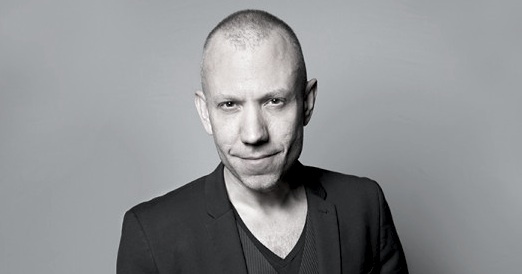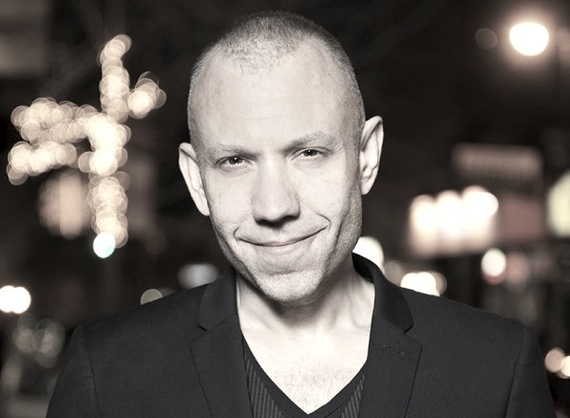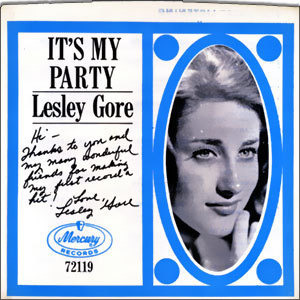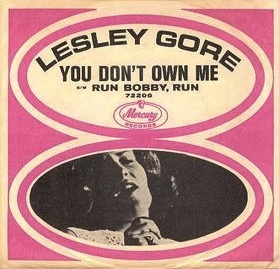By Rory Winston
"If only we could live one day, without the need to hide away", sang Kelly Porter (Bridget Fonda) in the 1996 film Grace of My Heart. It seems perfectly fitting that the aforementioned song, My Secret Love -- which describes the feelings of a closet lesbian pop singer/songwriter in the 1960s -- was co-written by none other than the legendary Lesley Gore.
Having literally gone from a 16-year-old high school student to the "It's My Party" pop sensation overnight, Ms. Gore, who very recently died of lung cancer, not only knew what it meant to be among the very first commercially successful female pop stars in the 60s, but also understood what it meant to be gay during a relatively intolerant and highly homophobic era.
Although it was already in her very first year of stardom that Gore sang You Don't Own Me, a song that would soon become a proto-feminist anthem, it was not until long after she left the limelight that she officially came out -- the occasion being the critically acclaimed PBS news magazine series In the Life in which Gore took part in 2004. Later that same year Gore began recording what would become her final album, Ever Since. After nearly a 30-year hiatus, the producer and cowriter with whom Gore chose for to collaborate was Blake Morgan of Engine Company Records. Shortly upon its release, the album was hailed as a triumph, having been lauded by everyone from Billboard Magazine to the New York Times to Rolling Stone.
Having gotten to know Morgan because of his ongoing #irespectmusic crusade -- a game-changing campaign I had written about earlier for the NY Resident Magazine -- I was in the unique position to ask him about the time he had spent working with Gore.
Godmother Gore
"How I got to know her in the first place...?" Morgan repeats my question while giving way to a warm smile, "Yeah, well, the first place was really quite some time ago." After a thoughtful pause, Morgan continues:
See, I was an only child and I grew up in an artistic household with lots of godmothers and godfathers. And Lesley (Gore), well, she was the one who first took me to Manny's on 48th Street in Manhattan.
For those unfamiliar with the legendary instrument store, it had a Wall of Fame with signed photos and instruments from auspicious customers the likes of Jimi Hendrix, Don Mclean, the Doors, Bob Dylan and the Who just to name a few.
Morgan muses, "Sadly, it (Manny's) is not there anymore. Anyway, I'd saved up money from my summer job to get my first keyboard and Lesley helped me get it with her 10-percent-off rockstar discount. So cool."
Vestiges of the enamored child remain in Morgan's voice; the glint in his eyes betraying the relevance it bears to this day. "She was the one who taught me how to drive," continues Morgan. "I was a teenager", he explains.
I was out at her and her partner's (Lois Sasson, famed jewelry designer) country house. She'd take me up and down the quiet road the house was on, teaching me how to drive and... One night, in dense dense fog and after some wine and a smoke, we realized halfway down the driveway, well, we realized it was never gonna happen...
Morgan gives way to a smile that evaporates in a blush and just as quickly brings on a shiver. He chuckles while recalling, "Yeah, we just sat there in the driveway and laughed and laughed until we thought we'd pass out. She was great to laugh with." Her husky and sonorous tone seems to pervade his memories. He continues unimpeded:
"My favorite small thing that she and I would bond about: she was the only other person I've ever known who could have breakfast any time of day", recalls Morgan. "We'd be on tour, and at 6 p.m. she's look at me and go, 'Egg Sand-Wish...?' We'd crack up about that and then just as suddenly go find one. A sand-wish (sic) -- a sandwich to wish for..."
The memory of a sandwish returns to Morgan with the type of urgency I could only imagine Sybil in J.D. Salinger's A Perfect Day for Bananafish would have felt had she been questioned about the existence of the mythical creature later in her life. Clearly Lindsey Gore like Seymour Glass had taught a child to see the world in a new way.
"Lesley was my rock and roll godmother", admits Morgan with a matter-of-factness that leaves little doubt as to her role in his life. "When I first met her, I was 11. Her partner was a dear family friend whom I'd known since I was a toddler, and when she got together with Lesley, well, that's how we met."
Morgan confides, "Since I was already well on my way to becoming a musician by that time, we had stuff to talk about right away." Pondering the development of their relationship, Morgan explains,
More than anything, she taught me... or rather she showed me what being a professional musician really looked like. She showed what taking a Red Eye flight back from somewhere felt like. No matter where she was coming from, she'd refer to as the Land of Cleve -- as in Cleveland -- even if that's not where she was returning from.
It was being on the road. She showed me what went on there. What happened backstage at a big show as much as what it looked like at a little one. All of it. The routine. The work that went into it. Not just flashy parts, but the sweat and grime, the not-so-pretty parts of the job; the full range of what this life entailed. I love her for that. I love that she did it. The lesson was invaluable.
Though from a different generation, Morgan's history was irrevocably tied to Gore's. "As I grew up, finding success in my own career, she watched," states Morgan. "She watched with a lot of pride. Eventually, I got signed by Phil Ramone and he was, after all, the engineer on most -- if not all -- of her (Gore's) most iconic hits back in the day." Then with great deliberateness, Morgan concludes. "I think it took a lot of courage and openness for Lesley to come to me and ask, as she did, if we could explore doing something together."
Morgan is referring, of course, to their collaboration on her final album, Ever Since. Recalling the journey with great emotion, Morgan continues.
Making that record together, being able to enjoy its critical and commercial success together, and it framing our relationship in the years since has a unique and poignant flavor to it that I'll never lose the taste of. I'm so glad we did that... so very proud to have made that with her. I always will be.
Women in the Music Industry
During the 1960s, Gore had few female paradigms which to follow. As she admitted herself in an interview for On the Beat TWC in 2009, in terms of music, there were, of course, artists like Sarah Vaughan and Ella Fitzgerald whose talent and voice could be envied; but there was an unbridgeable chasm between them and the rest since -- no matter how gifted -- the others would barely be scraping by. Even brilliant talents like the cool Jazz singer June Christie and the bebop genius Anita O'Day had a remarkably hard time. And they basically ended up traveling around the country from one town to the next -- smoking, drinking and hanging out with the guys in the band.
Though Gore had an easier time than many of her predecessors thanks to the pop hits -- meaning she could get by doing TV show circuits rather than having to rely exclusively on touring -- when it came to earning money, there certainly were hardships. Mercury Records not only took most of Gore's early earnings but she owned the label for years. As Blake Morgan is the first to explain, songs like "It's My Party," "Judy's turn to Cry," and "You Don't Own Me" didn't pay Gore anything no matter how many times they were played on the radio since it was only the songwriters that got paid per play.
Realizing that music was a fickle career, Gore did what few singers in her day did -- she enrolled in university. Incidentally, she didn't end up studying music, but majored in English literature instead. It was while attending Sarah Lawrence College that Gore came to the realization that she was gay. Never one to conceal her sexual orientation from those closest to her, Gore remained emotionally true to herself throughout her life. For her, the last decade and a half's battle over gay marriage was important in so far as civil rights were concerned. She thought that the "the more people understand that they probably already know a gay person, and already adore some gay people, the better off we're gonna be."
Out and Out Artist
Asking Morgan when he first found out Gore was gay, he gives way to a bemused smile, gesturing heavenwards with his hands as if to say when didn't he know and why would that in and of itself have been noteworthy. Then by way of explanation, he states:
You know, when I was a kid I was surrounded by gay and lesbian godmothers and godfathers and she was just one of them. We never especially had to talk about sexuality. I loved her partner. And Lesley was cool to me from the day we met and we became friends.
That was really it. In reality, in my entire life, I never really saw her run from or run towards talking about her sexuality with anyone. It just wasn't a thing, at least around me.
Morgan confides:
During the promotion for Ever Since, the issue came up more publicly and it got framed a bit like Lesley had decided to 'come out.' But I remember us talking about it and saying to her, 'Well, how can you come out if you've never been in?' She liked that a lot; and used it in many interviews during that period.
Fondly recalling Gore, Morgan adds, "She was always a courageous feminist, woman and lesbian; and I never saw her draw a line between being any one of those things."
"I can only imagine how hard it was for her back then", concedes Morgan pondering the general attitude women in the music industry face even today.
"I'm working with two female artists right now, actively, with new records out", explains Morgan.
There's Melissa Giges -- whose album has just come out -- and Janita whose album is about to come out. Each of them have to deal with being strong women with a strong vision in this era; and I have seen with my very own eyes how each of them wrestle with that on a daily basis.
Club owners, radio programmers, Promotion Directors... you name it. Every industry is sexist in some way, but I wonder sometimes if music doesn't take the cake.
Then almost as an afterthought, Morgan sighs and adds: "What Lesley must have had to deal with back in 1963 is simply unimaginable to me."
After a moment of reflection Morgan states:
And yet she did it. Lesley survived it, and kept her strength and vision. She kept her humor -- which was epic -- and she kept her soul. Maybe that's the most wonderful lesson she left me to learn: to work hard, laugh hard and keep your soul through it all.
And all this, while, making the very best music you can. And yeah. I'm gonna try to do just that. Yes, thanks Lesley.
Listening to Morgan reminisce about his days with Gore, I can't help but imagine Gore's "My Secret Love" return in the haunting form of a requiem -- one sung in her honor by Morgan: "I refuse to think of losing you. I won't give the world the chance of abusing you... My Secret Love."
Rory Winston is a published author/poet/playwright/TV comedy writer/columnist who serves as the Feature & Art Editor for the NY Resident Magazine and writes for LGBT News (FB) and www.LGBTFeed.com



